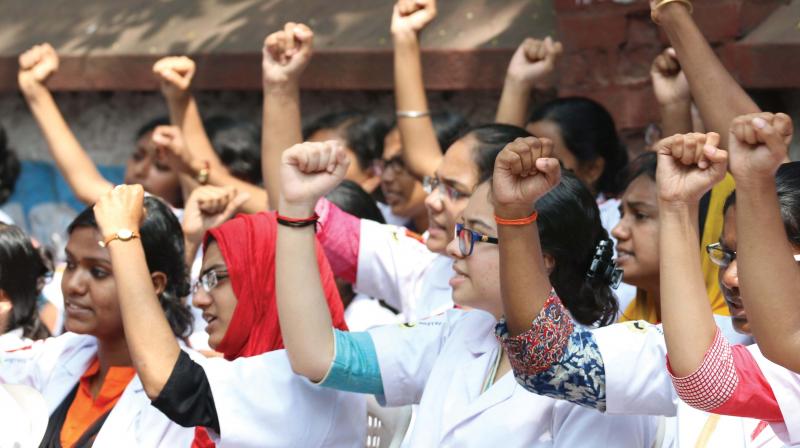NMC Bill has medicos on warpath

THIRUVANANTHAPURAM: The doctors' associations are up in arms against the National Medical Commission Bill which contains several controversial provisions like allowing ayurveda and homoeo doctors to practise modern medicine after clearing a bridge course. The MCI will also be replaced with a new body.
The associations say the Bill will result in the entry of quacks and unregistered practitioners besides putting the lives of patients at high risk. They say the new regulatory body will be packed with nominated members which also raises serious doubts about the centre's intentions.
The commission will comprise a chairperson, a member secretary, eight ex-officio members, including bureaucrats representing different ministers. There will also be representatives from different fields, including legal, economics, finance, health research and those working for the rights of patients.
What has raised eyebrows is the low representation for different states and union territories in the proposed medical advisory council. Only five part-time members representing states and UTs will be taken on the panel on a rotation basis for two-year terms.
When compared with the existing MCI set up which comprises 70 to 80 per cent elected representatives, the new council will have majority of nominated members.
"The National Medical Commission is totally against the principles of modern medicine. They are permitting unscientific systems to enter modern medicine sector. We suspect that it is only the beginning of a big scam," said Dr K.A. Raoof, state secretary Kerala Government Medical Officers Association (KGMOA).
The doctors' organisations allege that the ulterior motive of the Bill is to bring in indigenous medicine in an inappropriate way by diluting and controlling modern medicine. Ayurvedics, homoeopaths and others will get registration in modern medicine through Schedule IV of NMC, they allege.
"It would not be surprising if tomorrow the centre comes up with reservation for those coming from ISM through the bridge course in various departments," said Dr Raoof.
Health experts believe that the NMC looks like a centralised agency which is based on anti-democratic principles. "It is aimed at destroying the existing modern medicine sector. I do not agree with the proposal to bring in people from ISM on the pretext of providing more manpower in rural areas. The new system is anti-democratic and hierarchical. Moreover, it favours the private sector," said Planning Board member Dr B. Ekbal.
Earlier, the Union Ministry of Health and Family Welfare's proposal to amend the Medical Termination of Pregnancy Act, 1971 as part of the Medical Mission Bill had triggered a nationwide debate with the allopathy doctors associations and Indian Medical Association coming out strongly against the move.
They had opposed the proposal to allow the practitioners of ayurveda, siddha and homoeopathy to carry out abortions, pointing out that the move could have serious ramifications on the health of pregnant women even putting their lives in danger.
The doctors have serious reservations about the structure of the new commission. They say the move to replace a 150-plus member elected body with a nominated 20-odd member panel was totally unacceptable. Moreover, almost half of the members in the new commission would be persons who have absolutely no connection with medical profession.
Another concern being raised by the medical fraternity is the proposed increase in management quota. From the existing 15 per cent, it could go up to 60 per cent. The boards under the commission will be prescribing norms for determination of fees for a proportion of seats, not exceeding 40 percent, in the private medical educational institutions.
The MBBS students are also up in arms against the commission because of the anti- student proposals. After completing MBBS by taking 20 to 25 exams in five-and-a-half years, a person becomes a medical graduate. But the NMC proposal says it's not enough. The doctor will have to take another examination.
The IMA feels the licentiate examination proposed in the NMC is unnecessary. The quality of medical education will be badly hit and the cost of medical education and health care would go up if these provisions are approved.
Those in favour of NMC, however, say the new system will inject professionalism. At the moment, the MCI has become an exclusive organisation by the doctors, for the doctors and of the doctors.
In many countries, both medical professionals and non-medical professionals regulate the profession making it more transparent and accountable. The current style of functioning of MCI lacks transparency and professionalism which has adversely impacted the medical sector as a whole.
The Neeti Aayog had claimed that the draft Bill had received wide response from the public, professionals, representatives of various organisations and medical experts. Nearly 20,000 suggestions had come up before the team which were closely examined. These recommendations and suggestions were taken into consideration while preparing the Bill.

